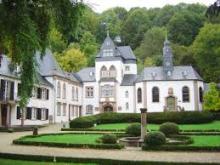Dagstuhl seminar on Computational Music Structure Analysis
On February 28th until March 4th, I'll take part in the Dagstuhl seminar on Computational Music Structure Analysis, organised by Elaine Chew, Meinard Müller and Juan Pablo Bello at Schloss Dagstuhl (Germany), the world's premier venue for informatics. I will give a talk on "MorpheuS: constraining structure in automatic music generation". You can download the slides and abstract of my talk here. During the workshop's concert Elaine Chew performed MorpheuS' Bach piece, more about the concert here.
Motivation of the workshop
Music is a ubiquitous and vital part of the lives of billions of people worldwide. Musical creations and performances are among the most complex and intricate of our cultural artifacts, and the emotional power of music can touch us in surprising and profound ways. Music spans an enormous range of forms and styles, from simple, unaccompanied folk songs, to orchestral music and music for other large ensembles, to a minutely constructed piece of electronic music. In view of the rapid and sustained growth of digital music sharing and distribution, the development of computational methods to help users find and organize music information has become an important field of research in both industry and academia. This seminar is devoted to a research area known as music structure analysis, where the general objective is to uncover the patterns and relationships that govern the organization of notes, events, and sounds in music.
Our objectives for the seminar are as follows: first, we will critically review the state of the art in computational approaches to music structure analysis in order to identify the main limitations of existing methodologies, while outlining a roadmap for future developments based on the most pressing challenges in this field; second, we plan to trigger interdisciplinary discussions that leverage insights from fields as disparate as psychology, music theory, composition, signal processing, machine learning, and information sciences in addressing the specific challenges of understanding structural information in music; and, third, we shall explore novel applications of these technologies in music and multimedia retrieval, content creation, musicology, education, and human-computer interaction.
General questions and issues that will be addressed in this seminar include:
Understanding, modeling and representing structural ambiguity
Hierarchical models for short-term/long-term structures
Measuring relevance of different musical properties and structure principles
Learning/fusing robust and expressive mid-level music representations
Handling partial similarity and structure invariances
Developing taxonomies/ontologies for structure annotation
Understanding structure across periods, styles and traditions
Influence of agents (composer, performer, listener) on structure
Adaptive and user-centered interfaces for structure visualization
Applications to content-based music indexing and organization
Content-based retrieval and navigation of music collections
As a key result of this seminar, we hope to achieve some significant progress in better understanding, modeling, representing, extracting, and use of musical structures. In particular, we plan to contribute to further closing the gap between music theory and psychology, and the computational sciences.
About Dagstuhl - Where computer scientists meet
Schloss Dagstuhl – Leibniz-Zentrum für Informatik GmbH (English: Schloss Dagstuhl – Leibniz Center for Informatics) is the world's premier venue for informatics. World-class scientists, promising young researchers, and practitioners come together to exchange their knowledge and to discuss their research findings.
The center promotes fundamental and applied research, continuing and advanced academic education, and the transfer of knowledge between those involved in the research side and application side of informatics.
The key instruments for promoting research are the Dagstuhl Seminars and the Dagstuhl Perspectives Workshops, which bring together internationally renowned leading scientists for the purpose of exploring a cutting-edge informatics topic. The friendly and open climate at the conference center promotes a culture of communication and exchange among the seminar participants.
The non-profit center is a member of the Leibniz Association and is funded jointly by the German federal government and a number of state governments.
